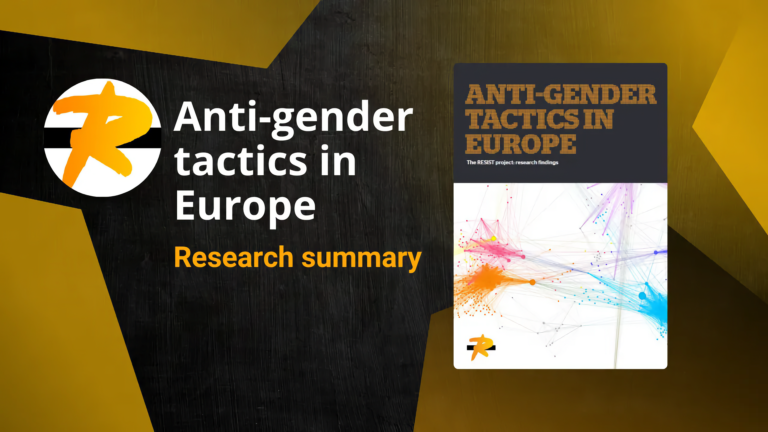Fostering Queer-Feminist Resistances Against ‘Anti-Gender’ Politics in Europe
In this blog, we look back on the two first years of the EU Horizon-funded project RESIST: Fostering Queer Feminist Intersectional Resistances against Transnational ‘Anti-Gender’ Politics, sharing insights about creating impact within and beyond academia.
RESIST examines how ‘anti-gender’ politics—those perpetuating patriarchy, heteronormativity, xenophobia, racism, and ableism—impact lives across Europe. More importantly, we explore how communities, organisations, and policymakers can push back to create a more inclusive and diverse society.
Here’s what we achieved so far:
Mapping the landscape of ‘anti-gender’ politics
Our initial focus was on understanding how ‘anti-gender’ politics are produced and expressed. We analysed almost 200 parliamentary debates, thousands of articles from 87 media sources, and encountered the ideas and interventions of thousands of political and cultural actors in Poland, Hungary, the UK, and Switzerland, as well as in the European Parliament. This analysis uncovered recurring ideologies and strategies, providing a foundation for our next steps.
What did we discover?
● ‘Anti-gender’ politics pivots on attacking gender as a concept, with gender being framed as an ideology that is being imposed on unwilling populations
● ‘Anti-gender’ politics pose a threat to women’s and reproductive health rights
● ‘Anti-gender’ intensifies the marginalisation and mistreatment of transgender people
● Claiming to defend children against the excesses of ‘gender ideology’ is a key way of fomenting suspicion of LGBTIQ+ people
● Oppressive ideas and practices are justified by appealing to liberal ideas and practices and presenting anti-gender politics as a defence of democracy.
“By collapsing all discussion of gender into the idea of an imposed gender ideology, gender diversity in society is denied legitimacy as a different way of thinking and being. (…) If [‘anti-gender’] actors succeed in convincing the public that certain identities are entitled to protections and others are mere ideas, marginalised groups are at risk.“
– RESIST Project Team, Anti-Gender Tactics in Europe
Interested in a more in-depth discussion?
We prepared not only an extensive report, but also a short “‘Anti-Gender’ Tactics across Europe” report that summarises the main findings in an accessible way. Soon, we will release national language versions of the publication.

Exploring the effects of, and resistances against ‘anti-gender’’ politics
Next, we turned to the people negatively affected. Through interviews, focus groups, and surveys in nine case studies—including Belarus, Poland, Ireland, Spain, Greece, Germany, Switzerland, France, and people in exile across the EU —we documented the lived impacts of ‘anti-gender’ politics. This participatory approach ensured that our findings were not only rigorous but also deeply grounded in real-world experiences.
What did we discover?
Attacks and systemic discrimination against people who support pro-feminist causes and LGBTIQ+ rights are frequent and occur in all national and transnational contexts.
Persons impacted by ‘anti-gender’ politics reported burnout, detachment, apathy, disbelief in social change, and are suspicious of institutions and law enforcement. However, it’s not all so bleak; people also highlighted being empowered by collaborative actions, mutual care and support, and willingness to fight against ‘anti-gender’ mobilisations. While coping with pressures, people are actively resisting oppressive mobilisations, for example by engaging with mutual aid and self-help groups, education, or taking legal steps.
“Collective mobilisation and solidarity actions appear to be vital elements in the strategies of activist communities. This often involves the formation of alliances or coalitions between groups, aimed at protecting themselves from physical threats while fostering a sense of community support and safety. Participants described how these efforts often hinge on the sharing of emotional bonds with members of communities where they feel a sense of belonging, as well as the exchange of strategies, resources, knowledge, and information.”
– RESIST Project Team, Effects of, and Resistances to ‘Anti-Gender’ Mobilisations Across Europe: A Report on Nine Case Studies
Want to learn more?
The results of our respective studies have been collected in an extensive full report and a separate publication that summarises transnational findings. In addition, each of the nine case studies released its own report.
Follow RESIST’s Academia.edu and ResearchGate profiles to stay updated about the upcoming national-language versions of the reports.
Communicating and disseminating research results across languages and geographies
With the research for the first two stages of the project being finalised, our Team could embark on the task of disseminating research findings across channels, countries, and languages.
Some of the highlights of our dissemination and communication activities up to date include:
● Interviews for Tok.fm and TVP Nauka (Poland), Onda Cero (Spain), RTÉ Radio 1 and Newstalk (Ireland), and several podcast appearances, including Der Lila Podcast(Switzerland) and Younified (Ireland).
● Media articles and blog posts in both mainstream outlets (with several thousands to millions of users) and LGBTIQ+ and feminist media. Some titles include: Gay Community News (Ireland), Breaking News (Ireland), Mediapart (France), La Vanguardia (Spain), La Noción (Spain), El Periodico (Spain), La Directa (Spain), La Liberté (Switzerland), Watson (Switzerland), Bundesverband Trans* (Germany) and Queer.de (Germany).
● Two online launch events for the first two stages of the project and two in-person launch events in Dublin and one in Athens. You can watch our online events here.
● Twelve conferences, workshops, sister-project initiatives, and EU-level events, including, among others, the Gender Equality Forum 2024 by the European Institute for Gender Equality (EIGE), the 7th European Geographies of Sexualities Conference, “Contesting 21st Century B/Orders” conference, and the Innocuous Spaces workshop organised by colleagues from the EU funded sister project UNTWIST.
What’s next: Affecting social change through collaborative research
In 2025, as part of RESIST’s project third stage, we are collaborating with 40 queer and feminist organisations across Europe to lay the groundwork for a transnational intersectional network aimed at countering anti-gender politics. We hope to contribute with this research to social struggles against ‘anti-gender’ mobilisations, to stop and reverse the entrenchment of heteropatriarchal power in societies in Europe and beyond.
EU Horizon grants prioritise research that drives real-world change. For RESIST, this means ensuring our work not only generates new knowledge but also empowers communities and informs policymaking. We’re doing this by mapping ‘anti-gender’ politics and collaborating with grassroots organisations.
In the next stage of our project, we will re-evaluate the existing theories and academic models against the lived experiences and practices that we have identified at the previous three stages. Together with our partners, we will generate concepts and tools that respond to anti-democratic threats.
For RESIST to make a difference, the fifth and final stage of our project will see us sharing the findings, toolkits and resources to support those who seek to create more democratic societies. We will work with our partners to offer a robust knowledge base and useful tools for community organisations and groups, policymakers and local authorities, and those who seek to create real world change within and beyond contemporary European societies.
